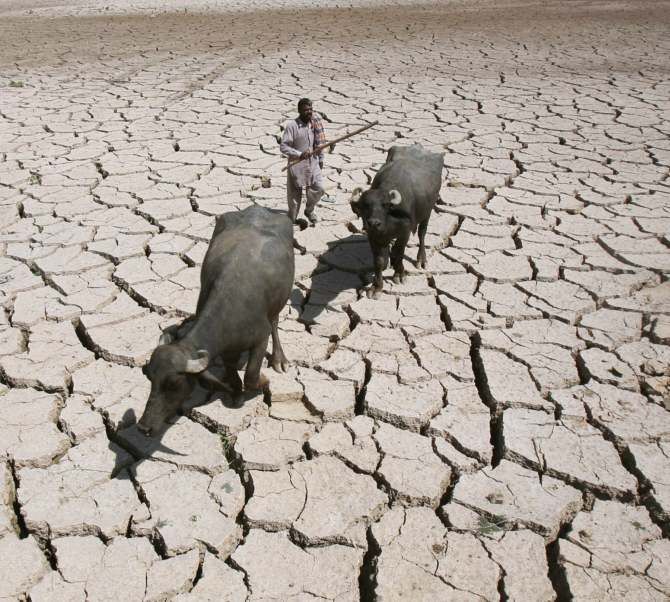The highest farmer suicides have been reported from Beed district

Marathwada is reeling under the worst drought in recent years, pushing scores of locals to migrate to cities in search of livelihood, with Beed witnessing a steep rise in farmer suicides accounting for 105 cases in August itself.
The agrarian crisis in Marathwada has been compounded for the fourth successive year, forcing many of the 25 lakh people in drought-wrecked region, comprising 70 per cent of the area's population, to cities like Mumbai in Western Maharashtra.
While Vidarbha reports the highest farmer suicides in the state, cases have been spiralling in Marathwada too which earlier faced a drought in 2012 and 2014. Crops had also been destroyed in the region which had been ravaged by hailstorms in 2013.
An official release said, Beed in Marathwada reported 105 farmer suicides in the single month of August this year with meagre rains destroying large swathes of crops.
The highest farmer suicides have been reported from Beed district with 177 cases this year. Osmanabad has recorded 98 cases while Latur has reported 61. The district of Parbhani has reported 41 cases so far this year, the release said.
Vasantrao Naik Sheti Swavalamban Mission chairman Kishore Tiwari claimed that 628 farmer suicides have been reported so far this year in Marathwada region.
The figure is already higher than the 574 cases recorded in Marathwada by the revenue department in the entire year of 2014 and three times higher than the cases recorded two years ago.
Out of Marathwada's eight districts, four -- Beed, Latur, Osmanabad and Parbhani -- are the worst affected this year.
As rains played truant, Osmanabad district recorded a meagre 187.9 mm rainfall between June to August while Latur received 212 mm; Beed 173.4 mm, Aurangabad 285 mm, Ahmednagar 151.2 mm, Solapur 98.8 mm and Parbhani 188.7 mm, the release said.
Till now, the state has received an average of 55 per cent rainfall (538.7 mm) and water storage in dams and lakes was to the tune of 49 per cent of its capacity, it said.
This time, as many as nine districts -- Nashik, Ahmednagar, Solapur, Kolhapur, Beed, Latur, Osmanabad, Nanded and Parbhani -- recorded poor rainfall between 26 to 50 per cent.
Only 119 talukas in these districts out of total 355 in the state received showers this year making the situation on the water-storage front very grim.
Besides, only eight per cent of water was available in dams and lakes in Marathwada, following which about 2,138 tankers have been pressed into service to distribute water to parched 1,638 villages across the Marathwada region, it added.
Water in 11 major dams and 8,500 medium and small, reservoirs in Marathwada has depleted to critical levels, triggering a major crisis.
In some areas the ground water level is about 800-900 feet which was an alarming situation, Tiwari, who has toured some affected areas in Latur and Osmanabad, told PTI.
Yet no contingency plan had been drawn up to counter the crisis, neither by the former Congress-Nationalist Congress Party government, nor by the ruling Bharatiya Janata Party-Sena government, said Tiwari, who enjoys the status of a minister of state.
What Marathwada is experiencing is a culmination of natural and man-made factors. Unseasonal rains too had a major role in precipitating the agrarian crisis, he said.
Marathwada is only a part of an unfolding crisis. In the coming days, the rest of the state will begin to experience similar hardships, Tiwari added.
Currently, households in Latur district get water once every 15 to 20 days. In Jalna and Hingoli, it is every eight days while for Beed it is once a week.
Now, the Kharif crop is facing extensive damage, Tiwari said.
On Monday, in the view of the severe drought, the state government had decided to open fodder camps with immediate effect in Beed, Ahmednagar, Parbhani and Solapur. Such camps have already been opened in Osmanabad and Latur districts, where households are now getting water once in a fortnight.
Recently, Maharashtra Chief Minister Devendra Fadnavis was on a three-day tour of drought-hit Marathwada region. Earlier, Union Agriculture Minister Radhamohan Singh visited the state twice and a central team toured the area thrice.
Image: Representation picture. Photograph: Reuters










